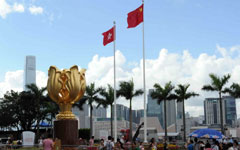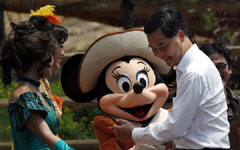Chinese mainland tourists are in the news again. But unlike the past when web postings went viral about their uncivil behaviors in France and Egypt, the latest headlines revolve around Hong Kong residents' protest against visitors from the mainland.
On Feb 16, about 100 Hong Kong residents marched from the Tsim Sha Tsui Star Ferry pier to Canton Road, a shopping street heavily frequented by tourists, including those from the mainland. The protesters referred to the tourists as "locusts" devouring Hong Kong's resources, calling the mainland visitors "shina", a derogatory term used by the Japanese to describe Chinese people after the 1895 Sino-Japanese War.
|
 |
|
 |
Referring to mainland tourists as shina was especially insensitive of the protesters. But my first reaction to it was to "get a grip". Locals across the world love to hate tourists and devise pejorative terms for them.
Although traveling is a wonderful and mind-broadening experience, it often requires one to have a thick skin. And as the recent upsurge of xenophobia in even former bastions of European tolerance like the Netherlands and Scandinavian countries indicate, the rising cross-national interaction associated with globalization has not made for greater understanding among people. In this instance, the old adage, familiarity breeds contempt, rings true.
This is not the first time Hong Kong residents have expressed anger over mainland tourists. In 2012, a group of Hong Kong residents issued a full-page advertisement in a newspaper which depicted mainland tourists as a giant locust over the city's skyline, while a video of a shouting match between mainland visitors and locals on a train went viral.
Hong Kong residents can be excused for resenting the earlier mass buying of infant formula by mainland tourists, which depleted supplies in local stores, although Hong Kong authorities have now taken steps to limit such purchase by non-residents.
